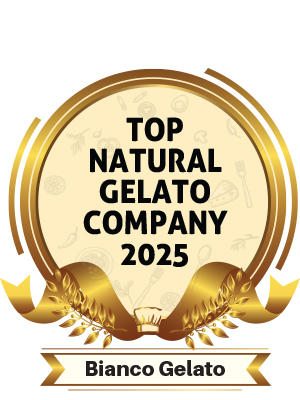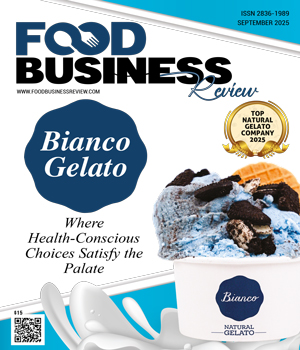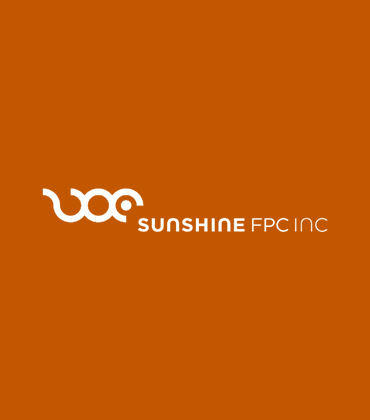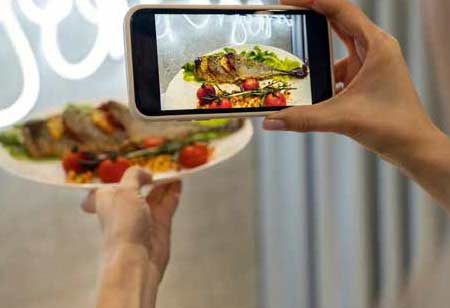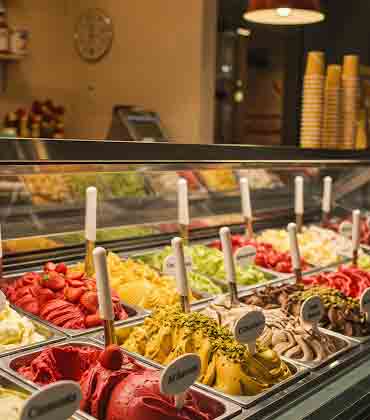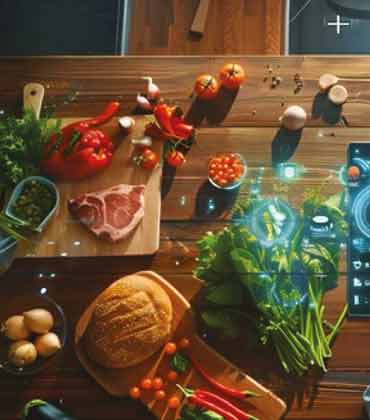Thank you for Subscribing to Food Business Review Weekly Brief
Few desserts evoke the same sense of joy as gelato. Its rich texture, vibrant flavors and slow-melting creaminess offer the ultimate in indulgence. But that pleasure comes at a cost, especially for those trying to avoid heavy dairy, added sugars or artificial ingredients added by non-artisanal producers. Despite the explosion of health-forward frozen desserts on the market today, with low-carb ice cream pints, dairy-free pops and adaptogenic scoops, gelato has remained largely untouched by the wellness wave. Bianco Gelato is reimagining gelato from a guilty pleasure into a health-conscious choice. “People still crave that luxurious, spoon-coating texture and bold flavor. But they’re also checking for dairy content, sugar levels and sourcing transparency,” says Leny Kou, general manager. “We didn’t want to make just another frozen dessert. We wanted to prove that even gelato can be redefined without compromise.” While traditional gelato is already lower in fat than ice cream, Bianco Gelato goes further. It strips away preservatives, artificial stabilizers and mystery ingredients. What emerges is a clean-label gelato adapted for modern lifestyle while preserving the flavor integrity of the original. Retailers are beginning to take note. The latest report by Whole Foods Market identified “permissible indulgence” as a top trend, noting increased demand for desserts that balance taste with clean, functional ingredients. Likewise, SPINS data shows that sales of plant-based frozen treats have grown at double-digit rates year over year, but premium gelato has not followed suit. Until now. Bianco Gelato responded to the gap with a lineup that features plant-based ingredients, organic coconut or almond milk, low-glycemic sweeteners and seasonal flavors from responsibly sourced organic fruits. Every batch is crafted in small quantities, preserving the artisan touch that made gelato an icon in the first place. For retailers, it’s a category that now feels timely. At a time when many consumers feel they must choose between health and pleasure, Bianco Gelato invites them to have both, creating a more intentional generation of dessert lovers.
Top Foodservice Management Consulting Firm 2025
Kinetic 12, a Chicago-based management consulting firm, is influential in helping the foodservice industry navigate complexity and pursue sustainable growth. In a sector shaped by fragmented value chains, and shifting consumer habits, the firm enables manufacturers, distributors, and operators to plan more strategically, collaborate more effectively, and execute with greater impact. Launched nearly a decade ago, Kinetic 12 initially focused solely on foodservice manufacturers but has since broadened its reach to serve the full ecosystem. Its work spans three tightly integrated service areas: strategic consulting, collaborative operator forums, and a marketing communications and culinary selling division introduced more recently. This holistic model allows the firm to craft effective strategies, ensure their precision implementation, and deliver real-world results. “Our tagline is ‘strategy, set in motion.’ We don’t just develop strategy, we make sure it gets activated,” says Art Bell, partner at Kinetic 12. Strategizing Beyond the 1 Percent Growth Plateau At the crux of Kinetic 12’s consulting practice lies a sharp focus on helping clients grow in a relatively stagnant market with an annual growth of just 1 percent. While demand for out-of-home dining remains intense, macroeconomic volatility, labor shortages, and shifting consumer expectations have pressured traditional growth levers. Kinetic 12 works closely with clients to mitigate this, redefining go-to-market strategies, optimizing trade spend, and developing customer segmentation models that reflect value and opportunity, not just scale. Through structured situation assessments and SWOT analysis, the firm builds tactical roadmaps and scorecards that align execution with strategic priorities, ensuring sales strategies and messaging are tailored to each client’s unique market context. One of its success stories involves a leading food manufacturer whose largest accounts were not delivering the best returns. Kinetic 12’s segmentation framework uncovered that these high-volume customers were not necessarily the most strategic. By applying a scorecard-based approach, the client shifted focus toward accounts with stronger alignment and higher ROI, reshaping commercial priorities and internal mindsets.
Top Food Service Consulting Firm 2025
In foodservice, no two kitchens tell the same story. Each space comes with its own quirks. For some owners, it might be an inefficient kitchen layout, where the walk-in cooler is too far from the prep line. For others, it’s standing in an empty building with no idea where to begin or how to make the space work. These dilemmas are compounded by a lack of industry knowledge and technical expertise, which quickly becomes an operator’s Achilles’ heel. For over five decades, JRA Food Service Design Consultants has been transforming operational frustration into functional flow. JRA goes beyond design, partnering with clients to solve real-world challenges through tailored, code-compliant solutions. Acting as both expert and educator, the company justifies every decision behind the “why,” navigates code requirements, and collaborates with inspectors to ensure a seamless path from concept to operation. “We translate complex regulations and operational challenges into thoughtful spaces tailored to each client’s vision and workflow,” says James Riemenschneider, president. “Because good design is more than just aesthetics. It is about empowering foodservice operations to run smarter, safer, and more efficiently.” From churches and schools to hotels, correctional facilities, and stadiums, JRA serves a wide range of commercial kitchen projects. With growing work in its fifth public market and high school culinary programs, the company’s broad reach keeps it adaptable in an industry where many firms narrow their focus. To cater to this diverse clientele, JRA takes an application driven approach that aligns with each client’s specific operational goals. This includes asking targeted questions across key areas such as receiving and storage, food preparation, cooking, serving, and sanitization. The engagement process is further strengthened by JRA’s long-term partnerships. As design consultants, the company collaborates with management advisory service (MAS) consultants who specialize in areas like menu development, labor analysis, and standard operating procedures. For clients unsure of where to begin, JRA connects them with trusted architects, general contractors, and local health departments for a smooth, coordinated process.
Top Food Packaging Solution 2025
Sustainability is a shared priority for both food brands and consumers, but the path forward for packaging isn’t always simple. Companies face increasing pressure to reduce polymer products, minimize waste and adopt greener materials, yet packaging remains the first line of defense, protecting food from oxygen, moisture and contaminants that impact safety and product integrity. The challenge lies in materials. High-performance solutions like multilayer laminates and foil-based films offer strong protection but are hard to recycle or compost. More sustainable options, such as mono-materials or compostable films, often fall short of cost requirements. It’s why even McKinsey reports suggest 60 to 70 percent of U.S. consumers still rank food safety above environmental impact when evaluating packaging. Sunshine FPC is helping brands move past this either-or mindset. It addresses the packaging design challenge head-on, guiding manufacturers toward sustainable materials without compromising on what keeps food safe, fresh and compliant. Its Modified Atmosphere Packaging (MAP) capabilities reflect this balance in practice. By precisely engineering oxygen and moisture transmission properties, Sunshine’s MAP structures extend shelf life by up to 35 percent. The result: reduced food spoilage, preserved product quality and improved efficiency across the supply chain, all while supporting ESG commitments. “We don’t treat sustainability as a bolt-on feature. It has to be engineered into the structure, alongside performance and safety, so brands aren’t forced to compromise,” says James Chuang, President and CEO of Sunshine FPC. Its compostable PLA and PHA films undergo identical rigorous testing as traditional materials, ensuring they support the protective requirements of MAP. Post-consumer recycled (PCR) content gets engineered to match sealing integrity as virgin resin, an essential factor in shelf-life preservation. This is backed by a robust quality system where Sunshine’s materials and processes align with FSMA, Prop 65, and BRC standards, all under an internal Quality Management System (QMS) embraced company-wide. This allows brands to lead on sustainability without risking operational performance or consumer experience.
Top Supplement Manufacturing Company 2025
Pure Private Label combines top-tier production with a built-in consulting and support layer to empower clients to build market-ready, better-positioned products. Whether they need custom formulations or turnkey private label products, the company delivers industry-leading turnaround times with an experience designed to be both smooth and scalable. That seamless experience is made possible by a dedicated three-person support team each client receives. Account executive carries deep supplement industry expertise, production coordinator manages logistics and administrative assistant handles day-to-day execution. Working behind the scenes, this team offers hands-on guidance around formulation, market fit and product strategy. The team also supports in labeling and compliance, positioning itself as a true strategic partner for brands looking to build efficiently and avoid missteps. “Our job is to take stress off the client’s plate to help them focus on marketing,” says Rush Ricketson, CEO. Typically, a manufacturer’s first point of contact is a sales rep with limited product knowledge and little decision-making authority. A brand might submit a formula only to wait a week or more for a quote, delayed by internal bottlenecks. Every follow-up triggers a new chain of internal requests, resulting in frustration and lost time. Pure Private Label flips that model by empowering its highly skilled, cross-trained account executive professionals to respond directly to client needs. Using proprietary tools and internal systems, they can turn around accurate quotes within 24 hours without requiring managerial approvals. This reduces turnaround times and keeps projects moving faster. Tailored Support for Every Stage of Growth Pure Private Label’s client onboarding process begins by identifying where each client fits within one of its three entry points. This includes new entrepreneurs building from scratch, existing businesses adding a supplement line, or established brands seeking a more capable, responsive manufacturing partner.
CXO INSIGHTS
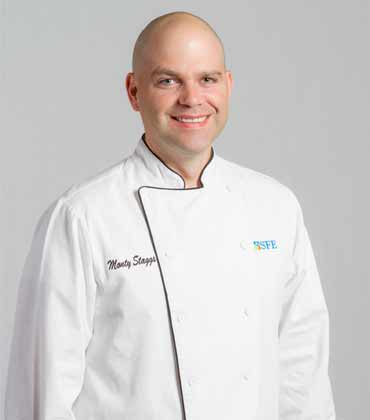
SFE - Students are Filling Their Plates with Alternative Proteins in School Cafeterias
Monty Staggs, Chief Executive Officer, SFE - Southwest Foodservice Excellence

Food Safety Culture
Steve Hammond, Food Safety & Quality Assurance Professional, Sandridge Crafted Foods

The Challenges to Selling Fresh Berries Around the World
VICTOR CEDILLO, LATAM & IC Sales Director, Driscoll’s

How to overcome current Challenges with Foodborne Pathogens in the Food Manufacturing Industry?
Riaz Ahamadeen, Vice President of Quality/Food Safety & Regulatory – North America, Oatly Inc

From Good to Great-A Story of Transformation with Culture at the Heart
Hugo Gutierrez, Global Chief Qshe Officer, Kerry
IN FOCUS
Natural Gelato's Journey to Global Popularity
Natural gelato gains popularity through quality ingredients, health trends, and ethical sourcing. It features artisanal production, bold flavors, and a rise in plant-based options, catering to discerning consumers.
The Consultant's Role in Building Resilient Foodservice Operations
Modern foodservice partnerships between consultants and clients prioritize strategic collaboration, mutual trust, a shared vision, and continuous knowledge exchange to foster long-term growth and resilience.
EDITORIAL
From Guilty Pleasure To Conscious Choice
This edition of Food Business Review examines how forward-looking companies are navigating this shift. As consumer expectations evolve and competition intensifies, food businesses are rethinking how they formulate products, engage employees, and build trust with customers. The path forward calls for agility, creativity, and leadership that understands both the science of production and the art of experience.
Taking the spotlight in this edition is Bianco Gelato, a brand transforming one of the world’s most beloved desserts into a health-conscious indulgence. By embracing plant-based ingredients, low-glycemic sweeteners, and sustainable sourcing, Bianco Gelato proves that gelato can remain luxurious while reflecting modern values of wellness and responsibility. Its clean-label approach represents a broader movement within the industry to show that pleasure and health do not need to be at odds.
Also featured in this issue, Steve Hammond of Sandridge Crafted Foods explains why food safety culture must extend beyond written policies, emphasizing hazard analysis, training, and recognition as the foundations of trust. In parallel, Adeniyi A. Odugbemi of ADM shares how automation is reshaping safety practices by minimizing human error, boosting efficiency, and freeing employees to focus on higher-value work—an essential step toward more resilient and sustainable food systems.
Throughout this issue, readers will see how innovation, responsibility, and consumer-driven trends are converging to reshape the food landscape. From redefining desserts to reinforcing safety culture and harnessing automation, the message is clear: the future of food is about delivering joy without compromise.
We invite you to explore these stories and share your perspectives. The next chapter of food will be written by those who can balance indulgence with integrity—and ensure that every bite reflects both.


